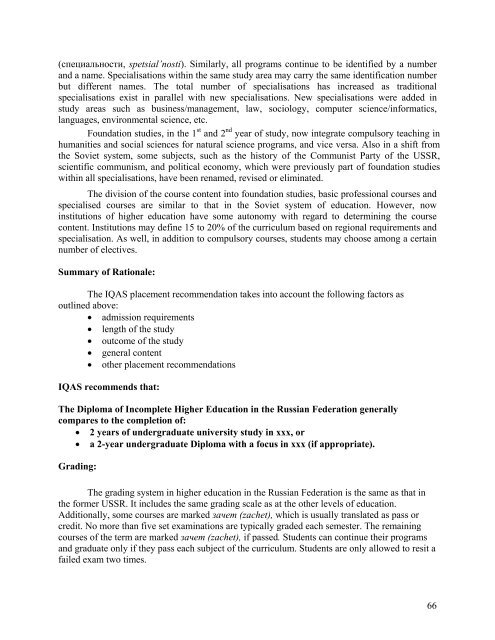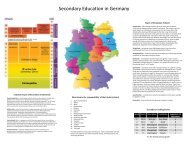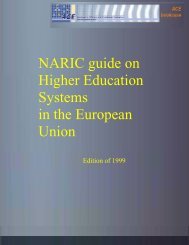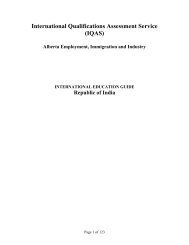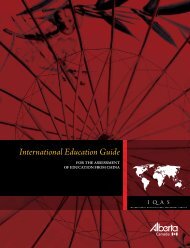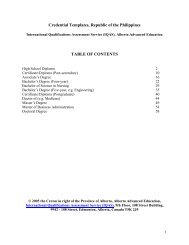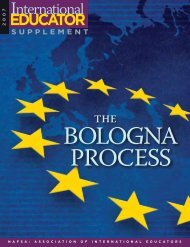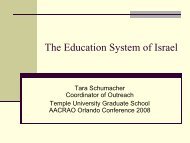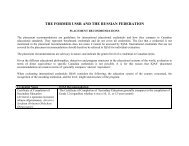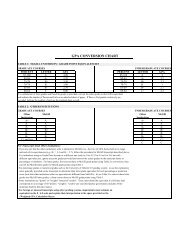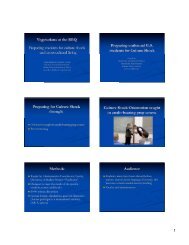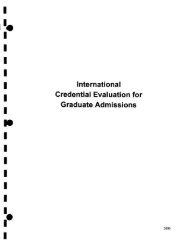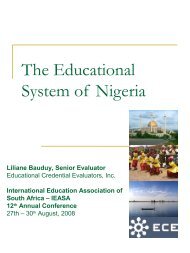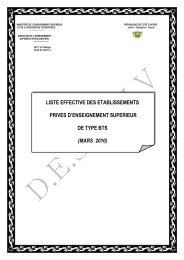Credential Templates, The Former USSR and the Russian Federation
Credential Templates, The Former USSR and the Russian Federation
Credential Templates, The Former USSR and the Russian Federation
Create successful ePaper yourself
Turn your PDF publications into a flip-book with our unique Google optimized e-Paper software.
(специальности, spetsial’nosti). Similarly, all programs continue to be identified by a number<br />
<strong>and</strong> a name. Specialisations within <strong>the</strong> same study area may carry <strong>the</strong> same identification number<br />
but different names. <strong>The</strong> total number of specialisations has increased as traditional<br />
specialisations exist in parallel with new specialisations. New specialisations were added in<br />
study areas such as business/management, law, sociology, computer science/informatics,<br />
languages, environmental science, etc.<br />
Foundation studies, in <strong>the</strong> 1 st <strong>and</strong> 2 nd year of study, now integrate compulsory teaching in<br />
humanities <strong>and</strong> social sciences for natural science programs, <strong>and</strong> vice versa. Also in a shift from<br />
<strong>the</strong> Soviet system, some subjects, such as <strong>the</strong> history of <strong>the</strong> Communist Party of <strong>the</strong> <strong>USSR</strong>,<br />
scientific communism, <strong>and</strong> political economy, which were previously part of foundation studies<br />
within all specialisations, have been renamed, revised or eliminated.<br />
<strong>The</strong> division of <strong>the</strong> course content into foundation studies, basic professional courses <strong>and</strong><br />
specialised courses are similar to that in <strong>the</strong> Soviet system of education. However, now<br />
institutions of higher education have some autonomy with regard to determining <strong>the</strong> course<br />
content. Institutions may define 15 to 20% of <strong>the</strong> curriculum based on regional requirements <strong>and</strong><br />
specialisation. As well, in addition to compulsory courses, students may choose among a certain<br />
number of electives.<br />
Summary of Rationale:<br />
<strong>The</strong> IQAS placement recommendation takes into account <strong>the</strong> following factors as<br />
outlined above:<br />
• admission requirements<br />
• length of <strong>the</strong> study<br />
• outcome of <strong>the</strong> study<br />
• general content<br />
• o<strong>the</strong>r placement recommendations<br />
IQAS recommends that:<br />
<strong>The</strong> Diploma of Incomplete Higher Education in <strong>the</strong> <strong>Russian</strong> <strong>Federation</strong> generally<br />
compares to <strong>the</strong> completion of:<br />
• 2 years of undergraduate university study in xxx, or<br />
• a 2-year undergraduate Diploma with a focus in xxx (if appropriate).<br />
Grading:<br />
<strong>The</strong> grading system in higher education in <strong>the</strong> <strong>Russian</strong> <strong>Federation</strong> is <strong>the</strong> same as that in<br />
<strong>the</strong> former <strong>USSR</strong>. It includes <strong>the</strong> same grading scale as at <strong>the</strong> o<strong>the</strong>r levels of education.<br />
Additionally, some courses are marked зачет (zachet), which is usually translated as pass or<br />
credit. No more than five set examinations are typically graded each semester. <strong>The</strong> remaining<br />
courses of <strong>the</strong> term are marked зачет (zachet), if passed. Students can continue <strong>the</strong>ir programs<br />
<strong>and</strong> graduate only if <strong>the</strong>y pass each subject of <strong>the</strong> curriculum. Students are only allowed to resit a<br />
failed exam two times.<br />
66


